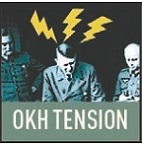tuffgong
Posts: 5
Joined: 10/3/2001
From: here
Status: offline

|
A couple thoughts on the discussion regarding the state of the game and historical plausibility from an old grognard who has followed this forum since before release, and whose history in gaming goes back to Avalon Hill and the glory days of SPI:
One factor in early game is that the German's don't get command skill advantages to the extent that they should. A lot of effort presumably went into rating commanders in terms of various characteristics, based on some evaluation of their performance throughout the war. This is not information that was available to supreme command a priori, and allows players to immediately assign the best commanders to what they deem critical areas and dump those who eventually proved to be duds, long before it would have become evident that one general was a "4" and another a "7". A mechanic that would better reflect reality and present the Soviet player in particular with more realistic challenges would be to hide commander's ability ratings, gradually revealing them over time as subordinate units experience combat and the leader's performance becomes evident. Ideally, a range would be presented for each numerical rating, with that range gradually narrowing over time. Since the overall set of leader ratings reflects the available talent pool, it would be reasonable to keep the set of ratings, but either randomize to whom they are assigned (so that players don't immediately know to replace, say, Popov with Konev because players already know their ratings) or, alternatively, hide the names of each general until their ratings become known, and randomly assign the generals at the start of the game. This could better reflect early-war command problems, present players with more "realistic" challenges, and make each campaign unique. Note that the Germans have the advantage of better average leaders, and should reasonably have better knowledge of many leaders' capabilities based on previous campaigns.
A problem causing the "unrealistic" advances in the game is not just the I-go, U-go weekly mechanic, but that individual units move sequentially through each week, rather than simultaneously. Combined with hex-control movement costs, this allows completely unrealistic movement. Consider an example where three units begin stacked, and the first moves through 14 enemy held hexes, converting them to friendly control. The unit thus moves two hexes per day through the contested territory. The second unit of the stack now traverses the now-friendly hexes at lower movement costs, and passes the first unit to convert additional hexes. The third unit gets the advantages of both sets of conversions and moves further still. This is absurd. When the first unit stops, the week is over. Following units shouldn't get what are effectively additional days of movement capacity for trailing it its wake. Michael T has elsewhere noted the confusion of fuel and time in the
movement mechanics, and this represents another confusion of movement cost and time.
The same mechanic causes "unrealistic" results in performing and exploiting breakthroughs. If a number of units expend, say, 90% of their weekly MP allotment (time) in moving into position, preparing, and executing a deliberate attack, thus displacing a defender, then 90% of the week has gone by at the time that defender has retreated. A nearby mechanized unit, sitting and waiting with full fuel tanks would "really" have only 10% of the week left, and 10% of its MP, to drive through the hole and exploit. It would not have a full week of movement to romp in the enemy rear.
There are various ways to fix these problems so that the game becomes something closer to a simulation of events, but most would impact the design beyond the scope of likely implementation for WitE and can only be hoped for in a more major redesign. The best "likely" fix would be to simply change things such that changes of hex control takes place at the end of each player's movement phase, rather than during each unit's movement. This wouldn't be "completely correct", but would be somewhat better than the mechanized advances seen, and would probably change the early game considerably. (An "improved kludge" might be to make all motorized units pay start-of-turn hex costs, but allow the slower infantry units, generally following in the wake of faster moving units, to take advantage of hex conversions by motorized units, but that seems likely to be beyond the scope of possible changes at this point).
A couple ideas to consider for the future, ignore, or argue about as the urge strikes one.
|
 Printable Version
Printable Version









 New Messages
New Messages No New Messages
No New Messages Hot Topic w/ New Messages
Hot Topic w/ New Messages Hot Topic w/o New Messages
Hot Topic w/o New Messages Locked w/ New Messages
Locked w/ New Messages Locked w/o New Messages
Locked w/o New Messages Post New Thread
Post New Thread